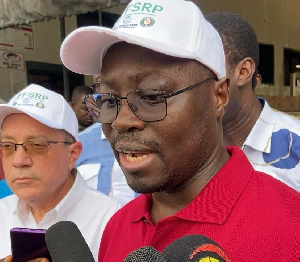The Dagbon chieftaincy dispute and the recent Anlo chieftaincy crisis in the country have raised the issue of the relevance of chieftaincy institutions in the country. Whilst people are entitled to their opinion on matters of public interest I do not share in their assertion that chieftaincy institutions have outlived their purpose in the modern world.
Ghana as a nation has seen some relative peace in the recent past. But in the few exceptions, a common denominator that seems to run through most of the instances of tension in the country is chieftaincy. Chieftaincy related crises have dotted all parts of the country and no region in the country appears to be exempt. The story has been the same across the country over the years. Some of them are celebrated whilst some ignored depending on whether lives were lost or not.
The recent memories of Dagbon where a prominent chief and his forty subjects were murdered in cold blood and that of the Anlo area where five people including a police officer were killed have caused some to think that the demerits of the chieftaincy institution may be gradually outweighing the merits. In 1997 chieftaincy related trouble crisis in Techiman, Buoyem and Tuobodom in the Brong Ahafo Region resulted in dozens of death and loss of property worth billions of cedis were lost.
These troubles notwithstanding, chieftaincy institutions play a crucial role in the development of the country. Our chiefs remain a focal point of our cultural identity. Chiefs provide leadership and serve as the embodiment of our culture, traditions and customs. The institution goes to the heart of what distinguishes us as a people from others. It portrays our uniqueness as a country, nation and our statehood. The institution if nurtured properly can serve as a medium for national development and the fostering of greater national unity.
Some traditional areas through their chiefs have been able to bring infrastructural development which politicians have not been able to do so. Annual festivals like the Kundum of the Nzemas, Odwira of the Agonas, Akwasidae of the Ashantis, Homowo of the Gas bring people together to contribute to development. Schools, markets place and electrification projects have all taken place under the auspices of chieftaincy institutions.
The Asantehene Otumfour Osei Tutu II name would forever be stenciled in the mental sheets of succeeding generations because of the Otumfour Education Fund. Thousands of people who have benefited from the Fund are not even Ashantis. The Okyenhene Ofori Panin Amoatia has become a lone ranger in campaigning for the environmental issue- an issue which does not seem to be popular at all with our politicians. I can go down the line and mention names of chiefs who have responded to the call of duty and have parted surging waters.
The image of the chief has metamorphosed from the warrior always leading the people in times of war to an executive position with assets such as lands, royalties from minerals and timber concessions at their disposal. This has brought have brought all manner of people to this once revered institution. There are those who seem to see chieftaincy as one of the quickest ways of amassing wealth is through becoming a chief. For this reason people kill and buy their way through to become chiefs.
These people have sadly become the bad nuts in the chieftaincy institutions. Today people want to become chiefs to be served but not to serve the people. If a chief wants to serve the people I do not think he would sell land earmarked for infrastructural development for posterity. The question is not in the chief selling the land but multiple sales of the land causing all sorts of land disputes and litigation.
During the Dagbon state of emergency, it was reported that the country was spending ten billion cedis a month in maintaining peace in the area. This money could have been channeled into developing the infrastructure in the area. During the 2003 National Governance Workshop in Kumasi, one participant suggested that if any particular district engages in a conflict, the state should pay for the cost of maintaining security from their portion of the District Assembly Common Fund (DACF). The Chieftanincy crisis in Anlo area is going to rob the district of much needed capital investment and would send the clock of progress back. So then, can we blame government for the non-development of the area? Even charitable organizations and NGOs do not operate in crisis ridden towns and cities.
In most of the crisis, there are those who are quick to link government with interference in chieftaincy.
The bottom-line in every chieftaincy crisis is the issue of who becomes the rightful successor to a throne when it becomes vacant. To minimize such conflicts, it is suggested that the National House of Chiefs, National Identification Authority (NIA) should collaborate with the Ministry of Culture and Chieftaincy Affairs to compile the succession plan for all skins and stool. If we can do this we would save the nation from any future chieftaincy crises.
CONCLUSION So is the chieftaincy institution a blessing or curse? Recent developments might seem to suggest the latter. In paraphrasing the words of James Lowell Russell that chieftaincy institution is like a knife that either serves us or cut us, as we grasp it by the blade or the handle. Some stools and skins have been able handle chieftaincy by the handle and have been able to get the best out of the institution. The Ashantis, Akyems, Dormaas etc. have seen great blessings from chieftaincy institutions. Other skins and stool lands handled chieftaincy issues by the blade and it has severed them severely. What is happening so far in the Anlos and Dagbons seem to suggest that the chieftaincy knife has been held at the blade edge thus cutting those who mis-handle it and leading to deaths and the destruction of property.
Going forward,















